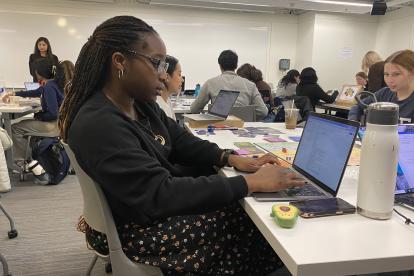
Students in Rukmini Balu's Social Determinants of Health class play a board game she designed to show how identity affects a person's ability to achieve and maintain health and wellbeing.
Published March 10, 2023 under Education News
It is a Wednesday morning in the Link classroom at Perkins Library, and students are gathered in groups of four or five around tables, each engrossed in playing a board game. As they roll dice and move pieces on the board, disparities begin to emerge. Some students have stacks of chips next to them, while others have only a few.
Each student in the class, a global health undergraduate course titled “Social Determinants of Health,” is playing a character with specific identities that influence their health, such as race, ethnicity, wealth, education and language. The goal of the game, called “Game of Life,” is to move forward while accumulating chips, symbolizing success and health. But some players’ identities have an easier time than others.
"What I love the most about this game is that it is dynamic and fun,” says Kashyap Sreeram, who is embodying a Black, low-income character. “A few minutes ago, I was at the bottom of the board, I think I am doing better now. And I am learning so much, too.”

Damilola Bankole types notes on her...
Seated across from Sreeram, Nina Dao, who is playing a white male, college-educated character, has an impressive stack of chips.
"More chips mean I am rich. I am white, male and college-educated after all," she says with a laugh.
As the students play, Rukmini Balu, Ph.D., an adjunct professor of global health, walks around the room, occasionally stepping in to explain a concept. She had the idea for the game after watching her children play “Monopoly.” She recognized a game could make learning social determinants of health more fun, impactful and engaging.
"I believe that practical learning through games can be a powerful tool for education," says Balu, who has taught global health courses at Duke and Duke Kunshan University since 2014. Formerly the chief of staff to Duke Health Chancellor Eugene Washington, she now serves as associate vice president for Durham and community affairs at Duke.
Developing the game took more than a year, Balu says. She researched and wrote game cards that detail health policies and developments that impact players’ movements. "That was the part that took the longest time as I had to incorporate the latest policy developments and do lots of fact-checking," she says.

Rukmini Balu was inspired to create a...
Close by, a student moves their game piece to a space that prompts him to read a card. The card describes the American Jobs Plan, a U.S. federal policy passed in 2021 that includes subsidized employment for Americans without jobs or with certain disadvantages in finding employment. “If you are a Black person or American Indian/ Alaska Native, take 1 step forward. If you do not have college or higher education, take 1 step forward,” the card reads. The student, playing a white character with little formal education, moves his piece a step forward.
Other cards demonstrate the barriers people can face based on the circumstances of their birth. Some cards tell people to move backward if they live in neighborhoods that put them at higher risk for disease or if they don’t speak English and may have trouble communicating in a medical emergency.
At a table at the far end of the class, the game is coming to an end. One student rolls the dice, and their character lands on a space that requires them to read a policy change card aloud. Thanks to the supportive policy, the character can advance two spaces ahead. The next student rolls the dice, and their character reaches the final space on the board, ending the game.
However, the students' work is not yet over. They will write two papers: one on their experience focused on the character they embodied and the other exploring the inequities they observed and the comparative experiences of their fellow gamers.
But the game seems to have had its intended effect. “The game makes me think and clearly understand how one’s circumstances, often beyond control, can influence health outcomes,” says Damilola Bankole.


